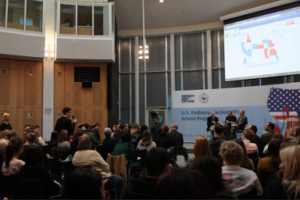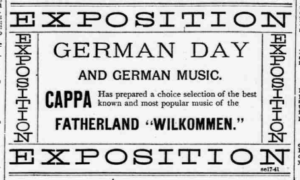We’re in our tenth year of Maple Leaf & Stars and Stripes
 At the dinner table, on the train, or at work, we witness discriminatory language or racist remarks from time to time. We often know that we should say something, but we – for one reason or another – do not always get involved. Many people would like to do more but don’t always know how. Dr. Nancy Dome, who has worked with children and educators for over 20 years, has literally made that quandary both her business and mission. This week’s blog features an interview with the CEO of Epoch Education about fostering the understanding of diversity and the development of inclusive cultures.
At the dinner table, on the train, or at work, we witness discriminatory language or racist remarks from time to time. We often know that we should say something, but we – for one reason or another – do not always get involved. Many people would like to do more but don’t always know how. Dr. Nancy Dome, who has worked with children and educators for over 20 years, has literally made that quandary both her business and mission. This week’s blog features an interview with the CEO of Epoch Education about fostering the understanding of diversity and the development of inclusive cultures.
The 2020 U.S. election has people around the world on the edge of their seats, wondering who will become the next President of the United States. The two candidates – former Vice President Joe Biden and the incumbent President, Donald Trump – would become the oldest men to ever have held this office. Another ‘first’ is Biden’s VP pick, Kamala Harris, junior senator from California, the first-ever woman of color running on a presidential ticket. In addition, a global pandemic, an economic crisis, and nationwide demonstrations protesting systemic racism make this election more exciting than ever.

While U.S. pollsters, such as Larry Sabato or Nate Silver, predict a likely victory for Democrat Biden, Trump’s 2016 surprise upset lead many pollster to ask how reliable election polls really are. And sometimes, the best pollsters are not those featured in the news, but are those found in high school classrooms.

January 1, 2000. Not just a new century, but a new millennium. Spotless, for the briefest moment, though far from empty. Arriving so brimful of promise and hope. “What will it be like?” we wondered, staring almost child-like at the clock as it approached the new era. A brand-new, unopened, ready-to-use millennium! And this time, with all we’d learned over past millennia, we would get things right.
Knock on wood.
It is one of the founding myths of “German Americana” that the first migrants from German-speaking territories arrived on October 6, 1683, on North American soil. Unsurprisingly, German Americans have always sought to celebrate this particular date in order to promote and to secure German American traditions and interests. Such celebrations, formerly often called “German Day,” flourished during the 19th century and ceased after the world wars. After the 1983 tricentennial, German American stakeholders were able to revive and to continue the celebrations: On August 18, 1987, Congress approved a joint resolution to designate October 6, 1987, as German-American Day.
Since that time, most American presidents have issued annual proclamations to celebrate the achievements and contributions of German Americans to our Nation with appropriate ceremonies, activities, and programs. Also, German American societies have taken on the ‘task’ and included annual German-American Day celebrations into their calendars, often in combination with the famous Oktoberfest.

I know the monsters that lurk in the recesses of the mind and in
the dark corners of the heart. I know, because I deal with my own demons
of what was and what might have been. I’ve heard those voices calling in the night.
I understand, because I poked my head through that door and looked around a bit.
And I gotta say, it’s not a terribly scary place. I wasn’t frightened there,
in that room where death is. I understand why people go there.
And I understand why people chose to stay there.
Ira Wagler, Broken Roads, p. 187–188
-
 Growing Up Amish, Ira Wagler’s New York Times bestseller has sold some 185,000 copies since it first appeared in 2011. A writer whose first book makes that list has much to live up to. Some writers never make it past the first book, while others end up wishing they had only written one. And if I am honest, I have to admit that I was somewhat concerned about what I would do if I didn’t like Ira Wagler’s new book. After all, he’s been to my university twice, and over the years, I’ve got to know and appreciate him. The book is not quite what I had expected, and it is truly different in a few key ways from his first publication.
Growing Up Amish, Ira Wagler’s New York Times bestseller has sold some 185,000 copies since it first appeared in 2011. A writer whose first book makes that list has much to live up to. Some writers never make it past the first book, while others end up wishing they had only written one. And if I am honest, I have to admit that I was somewhat concerned about what I would do if I didn’t like Ira Wagler’s new book. After all, he’s been to my university twice, and over the years, I’ve got to know and appreciate him. The book is not quite what I had expected, and it is truly different in a few key ways from his first publication.